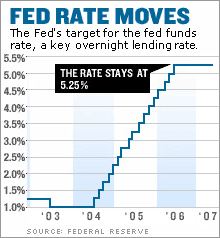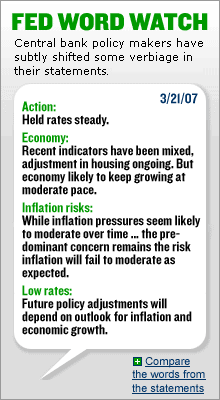Summer vacation for the FedThanks to the big spike in Treasury yields, economists think Bernanke & Co. can stay on hold for the foreseeable future even though inflation concerns persist.NEW YORK (CNNMoney.com) -- The Federal Reserve would seem to be an unlikely beneficiary of this whole user-generated content phenomenon. Yet, when the Fed's policy-making committee completes its two-day meeting Thursday, it may find that it doesn't have to do much thanks to the fact that "users" - in this case, the bond market - have already done the Fed's job. Sure, inflation may still be at levels that make the Fed a bit nervous, particularly with oil prices hovering just below $70 a barrel. And The Wall Street Journal reported last week that the Fed is still worried about future pricing pressures. The Fed usually raises rates when it is concerned about inflation. But Fed chairman Ben Bernanke and his cohorts may not need to raise interest rates to combat inflation any time soon since "you" - fixed income investors, that is - have already boosted rates for them. The yield on the benchmark U.S. 10-year Treasury note, which impacts the rates on mortgages and many other consumer loans, has risen from a year-to-date low of 4.47 percent in mid-March to about 5.08 percent currently. That's despite the fact the Fed has kept the federal funds rate, an overnight lending rate for banks, steady at 5.25 percent since August 2006. "The bond market has taken care of things for the Fed and then some," said Keith Hembre, chief economist of First American Funds in Minneapolis. Hembre said that the effect of the recent movement in bonds is a "stealth tightening" equivalent to what could have been accomplished by a full percentage point increase in short-term rates by the Fed. According to federal funds futures listed on the Chicago Board of Trade, investors are pricing in a zero percent chance that the Fed will change interest rates on June 28. "I think the more the Fed talks and the less they do, the better the outlook is for them. The bond market has been doing a lot of the heavy lifting for the Fed at this point. The Fed probably won't have a need to increase rates as long as the inflation outlook remains in line," said Oscar Gonzalez, an economist with John Hancock Financial Services in Boston. To that end, traders are betting that the Fed is likely to remain on hold for several more months, with investors pricing in only a slight probability of a one quarter of a percentage point rate cut by year's end. Drew Matus, an economist with Lehman Brothers, said the Fed is likely to keep rates steady for the foreseeable future. He said even if the central bank abandons its assessment of core inflation as "elevated" in the June 28 policy statement, which some Fed watchers expect, that should not be interpreted as a sign that the Fed thinks inflation is dead. "The short-term outlook for inflation is getting better but the medium and long-term outlook is getting worse," he said, adding that central banks around the globe have been raising interest rates lately in order to curb growth and ward off pricing pressures. But Jim Glassman, senior economist with JP Morgan Chase, said the Fed doesn't need to be worried about inflation, or even short-term moves in the bond market, because he thinks the Fed's horizon is longer term than fixed-income investors. "The bond market is irrelevant to the Fed. It is a weather vane," he said. "The Fed is not about to do anything since the economy seems to be coming back to life and the issue right now is how to describe the economy. It may not make sense to describe inflation any more as uncomfortably high." Chris Probyn, chief economist with State Street Global Advisors in Boston, agrees. He said the bond market isn't reacting to higher inflation but is merely playing catch up with the Fed, since it looks more likely that the Fed will remain on hold for a while. "Not much has changed. I wouldn't say the bond market has done a whole hell of a lot," he said. "I think the market simply reassessed the chances of the Fed cutting rates any time soon and figured it was time to push 10-year yields closer to the overnight lending rate." Still, Glassman said the Fed is in bit of a "weird environment" since even though it seems like the economy is improving, consumers are feeling a pinch from higher prices at the gas pump. Plus, wages haven't increased so dramatically to make consumers feel as if the economy is in that great shape. "Consumers are getting a little squeezed. Right now there is some angst about this," Glassman said. Along those lines, economists said the Fed's next move will depend largely on what's happening in the U.S. job market. Hembre argues that the recent spike in bond yields could slow the economy in the second half of this year and cause the unemployment rate to tick up. If that happens, the Fed could lower rates by early 2008. But Matus believes the job market will remain relatively strong. "Unemployment will remain reasonably low. One of the great, unrecognized things in the job market has been that the sectors adding jobs to the economy tend to be the more stable sectors like healthcare and leisure," Matus said. "And jobs are being added there because of demographics. So unless people suddenly start getting younger, I wouldn't expect job cuts in healthcare or leisure any time soon," he added. |
| ||||





